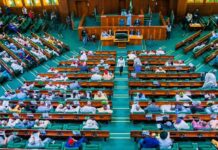The recent controversy trailing the announcement by Central Bank of Nigeria(CBN) to redesign the naira has been rested with President Muhammadu Buhari on Sunday stamping that the decision of the CBN to launch new designs and replace high value Naira notes had his support and is convinced that the nation will gain a lot by doing so.
Speaking in a Hausa radio interview with the famous journalist Halilu Ahmed Getso, and Kamaluddeen Sani Shawai to be aired Wednesday Morning on Tambari TV on Nilesat, President Buhari said reasons given to him by the CBN convinced him that the economy stood to benefit from reduction in inflation, currency counterfeiting and the excess cash in circulation.
He said he did not consider the period of three months for the change to the new notes as being short.
”People with illicit money buried under the soil will have a challenge with this but workers, businesses with legitimate incomes will face no difficulties at all.”
In the interview, the President also addressed issues of food security and national security, among others.
However, an economic expert and Managing Partner of Kedrus Consulting Mrs. Stella Justin- Tochukwu expressed that the CBN policy of redesigning the Naira notes is a good one
According to her the idea is not a bad one; It has the possibility of reducing inflation, reducing the exchange rate of naira to dollar and improving the life of an average Nigerian.
She noted that ‘If 80 percent of the naira is truly in circulation at the moment, it then follows that one of the significant causes of the current inflation in the country Is Excess Money In Circulation Or Excess Supply Of Money. In Macro Economics, having excess money in circulation makes the supply of money higher than demand for money and the result of this is INFLATION.
‘’What this means to a lay man is that, because there’s too much cash going around from person to person, the value of money will reduce. So too much money will be chasing too few goods. For example, you’ll need to charge significantly higher for your product or service to make profit.
As a result, prices of goods and services will keep skyrocketing. You keep paying more to receive less value – Hyper inflation.
‘’When a monetary policy that helps to suck up the excess money in circulation is adopted. We’ll have less money in circulation. The value of Naira will appreciate because now, Demand for naira will become higher than the Supply, leading to deflation.’’ She stated
‘’As a result, prices of goods will fall and the money will be stronger enough to compete favourably at foreign exchange.But Nigerians are concerned with this: “That people will convert their hoarded Naira to dollars and it will further cripple the Naira”…
‘’Here’s my submission again: Converting the existing Naira to dollars at the moment will not cripple the Naira.Reason being that, people will not use the converted dollars in their custody for regular transactions within Nigeria. By the time they’ll try changing their stacked up dollar to Naira, the demand for Naira would have increased, the value for Naira will appreciate and exchange rate will fall in favour of Naira.
She said with the alarming rate of counterfeits available with the current Naira design,
I’m of the opinion that more security features should be embedded in the new designs that will drastically reduce the ease of counterfeiting.
‘’Security features are innovative elements that are used to differentiate between fake and original bank notes.They are usually added during the production of bank notes.
These security elements are usually very unique and difficult to imitate. As a result, bank notes with very secured features have lower incidence of counterfeiting.
Some of the security features that are quite common are paper type and paper quality, intaglio printing, watermarks, security threads, latent image and so on.They may also be visible or invisible. She stated
‘’Adopting advanced security solutions for the naira and educating the public on how to recognize these features will go a long way to make the new Naira notes difficult to forge.
Meanwhile, the Central Bank of Nigeria (CBN) maintained that it followed due process in its decision to redesign some denominations of the naira, adding that the exercise was 12 years overdue.
The Minister of Finance, Budget and National Planning, Zainab Ahmed last week said that the Central Bank of Nigeria (CBN) did not carry her Ministry along in its plan to redesign and roll out new N200, N500 and N1000 note effective December 15.
But in a swift reaction weekend, the CBN said it was surprised by the minister’s outburst and that due process was followed in arriving at the Naira redesign project, including obtaining the approval of President Muhammadu Buhari.
In response to claims by the Minister of Finance that her ministry was not carried along by the CBN in the Naira redesigning, the apex bank maintained it followed the law and due process to carry out the exercise, “which is 12 years due.”
Spokesman of the CBN, Osita Nwanisobi in a statement expressed surprise at the minister’s claim, stressing that the CBN remains a very thorough institution that follows due process in its policy actions.
He said the management of the CBN had duly sought and obtained the approval of President Buhari in writing to redesign, produce, release and circulate new series of bank notes.
While urging Nigerians to support the currency redesign project, he said it was in the overall interest of Nigerians, reiterating that some persons were hoarding significant sums of banknotes outside the vaults of commercial banks.
He noted that currency management in the country had faced several escalating challenges “which threatened the integrity of the currency, the CBN, and the country” adding that every top-rate Central Bank was committed to safeguarding the integrity of the local legal tender, the efficiency of its supply, as well as its efficacy in the conduct of monetary policy.
On the timing of the redesign project, Nwanisobi explained that the CBN had even tarried for too long considering that it had to wait 20 years to carry out a redesign, whereas the standard practice globally was for central banks to redesign, produce and circulate new local legal tender every five to eight years.
Assuring Nigerians that the currency redesign exercise was purely a central banking exercise and not targeted at any group, the CBN spokesman expressed optimism that the effort will, among other goals, deepen Nigeria’s push to entrench a cashless economy in the face of increased minting of the eNaira.
This, he said, is in addition to helping to curb the incidents of terrorism and kidnapping due to access of persons to the large volume of money outside the banking system used as a source of funds for ransom payments.
Meanwhile, a former Deputy Governor of the Central Bank of Nigeria (CBN) Prof. Kingsley Moghalu, commended the apex bank on the proposed redesigning of the Naira.
Moghalu, in a statement on Saturday in Lagos, however, advocated a 90-day window for implementation.
He said: “I fully support the Central Bank of Nigeria in redesigning the Naira. If 80 per cent of banknotes in circulation are outside the banks that is troubling.
“The CBN obviously wants to force all those notes back into the banking system. Those with the notes must surrender them to get new ones or else it becomes illegal tender after Jan. 31, 2023.
“This is also a way to withdraw currency from circulation, an unorthodox way of tightening the money supply since the country is battling high inflation.
“The flip side is that people who are holding huge amounts of cash outside the banking system for nefarious reasons will go to the parallel forex market to buy hard currency, putting further downward pressure on the value of the Naira as too much Naira will be chasing too few dollars,” he said.























